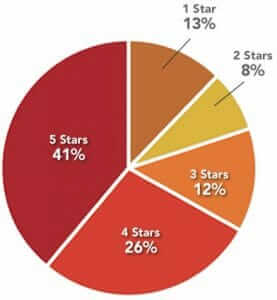Yelp can be critical to your practice success, so you need to make the most of your “yelper” reviews. Have you looked on Yelp? 
- Verify your Yelp information and make sure it is correct. Doctors often forget about changing information in some places when they move or change other information. It’s a perfect time to review your basic information to ensure that it is correct.
- Move positive reviews out of Yelp’s filter. The algorithm filters any reviews that look like spam. You can help add credibility to your reviewers by:
- Following them on Yelp.
- Telling them to add a profile picture.
- Activity shows that it isn’t spam. Most reviewers have both positive and negative feedback, so regular activity on Yelp is proof enough.
- Ask them to check-in on their mobile phone to show they are human.
Where to the Yelpers live? They don’t come with a sign, and it doesn’t always come up in conversation. I’ve never known anyone who can tell a Google reviewer from a Yelper. So, ask for reviews from your patients. You can always use a great testimonial, and they don’t all have to be the same. When you try to push your patient into posting a review in a new place, it rarely happens. But, let them choose where they are comfortable, and it increases their motivation.
Whether it’s on Yelp, Facebook, Google reviews or a medical review site, don’t overlook people who can add credibility to your reviews. Here are some people to ask:
- Patients: This includes both current and potential patients. It may be a patient who purchased a product, had a procedure or a consultation. When it comes to reviews, every opinion counts. But, it’s usually the people who ask that get the good ratings!
- Vendors: You interact with the people each day, so who knows you and what you do better than a vendor does. If you’ve been working with a vendor a year or so, that person should have a good awareness of the type and quality of work and products that you offer. Ask for a review.
- Friends and Co-workers: Think about all the work and products you provide for friends and co-workers. Did you offer helpful advice to a friend? Does a friend or acquaintance purchase a product from you? If so, those people qualify as reviewers. Ask.
- Extended Family: How many family members do you help with free or low-cost procedures, products, services and/or advice? In many cases, some of your most loyal patients may be extended family. Don’t shy away from asking for reviews from these people.
Reviews are legitimate when you’ve performed the procedure, given advice or sold the product to someone who has used it and can comment on it. Unfortunately, positive reviews take a back seat to negative reviews if you don’t soliciting reviews.
Don’t leave your online reputation to chance! Manage your Yelp reviews. Manage your online reputation. If you need help establishing or managing your online reputation or reviews on a specific site, ask PUMC. We have professionals in our organization that specialize in online reputation management, and we can help you boost your credibility. Whether you need a little or a lot of help, you can count on our professionals to find the answer that’s right for you.
Note: Pie chart on starred reviews on www.yelp.com.
